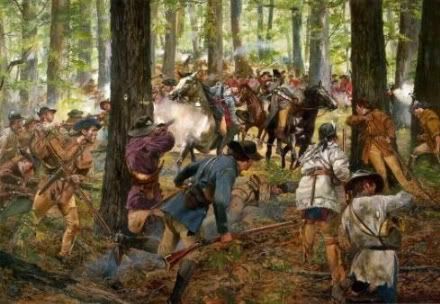The Battle of Kings Mountain was fought by men who chose their own commanders. Image
Scots-Irish settlers, tired of British oppression, had set up a largely autonomous government in the Appalachians in 1772, then a remote part of the American colonies (modern day northeastern Tennessee). They'd refused to take a British loyalty oath. British Col. Patrick Ferguson resonded in 1780 threatening to "march his army over the mountains, hang their leaders, and lay their country waste with fire and sword" unless the community complied.
The dissent by the "Overmountain" people in the face of death and the subsequent "Battle of Kings Mountain" resulted in a stunning victory by citizen military force that selected its own leaders and held them to account. It changed the course of the Revolutionary War by leading the British to turn back from the Southern colonies and march to their eventual end at Yorktown.
Resistance to World War I
Woodrow Wilson was reelected president of the United States in 1916. He campaigned on his record of keeping the nation out of the war in Europe. Within a year, the war to "save democracy" was declared and troops were fighting. Many who'd voted for Wilson saw a vital campaign promise betrayed and others emphasized the slim justification for war. Railway worker, labor organizer, and Socialist Party of America leader Eugene V. Debs was one of them.
Wilson responded with the Espionage Act. The law barred free speech that criticized and impeded the president's war policies. The New York Times characterized Debs as a terrorist, ignoring his well publicized history of opposing violent action.
Debs and others in the Socialist Party were prominent in opposing the war. He spoke on the war in Canton, Ohio on June 16, 1918. Referencing the threats to imprison him and other war critics, he said: "I would rather a thousand times be a free soul in jail than to be a sycophant and coward in the streets." Debs described World War I as a capitalist conflict that had nothing to do with the people. Then he made this statement about speaking out when few support your position:
"It is the few who have had the courage to take their places at the front; who have been true enough to themselves to speak the truth that was in them; who have dared oppose the established order of things; who have espoused the cause of the suffering, struggling poor; who have upheld without regard to personal consequences the cause of freedom and righteousness. It is they, the heroic, self-sacrificing few who have made the history of the race and who have paved the way from barbarism to civilization. The many prefer to remain upon the popular side." Debs, June 16, 1918
Debs was arrested for sedition and convicted under the Espionage Act for anti-war statements during the Canton, Ohio speech. He went to prison in 1919. While incarcerated, ran for president in 1920 receiving nearly one million votes.
Debs addresses the people in Canton, Ohio Image
After the war ended, President Warren G. Harding released Debs on Christmas Day 1921 and invited him to the White House. The initiation and repeal of the Espionage Act plus the controversy surrounding Debs imprisonment are credited with sparking a broad public interest the Bill of Rights, particularly the First Amendment.
In the case of the "Overmountain" settlement, the dissent from oppressive power resulted in a military conflict. Opposition to an unjust war was the basis for dissent on the part of Debs and others in the face of ten years in prison. In both cases, dissent led to courageous action that enriched our history and rights as citizens to speak freely and act in our principals.
Who are these insiders who tell us what we can and cannot say?
"In the Republican and Democratic parties you of the common herd are not expected to think. That is not only unnecessary but might lead you astray. That is what the "intellectual" leaders are for. They do the thinking and you do the voting. They ride in carriages at the front where the band plays and you tramp in the mud, bringing up the rear with great enthusiasm."
E.V. Debs, June 16, 1918
(Note: You can view every article as one long page if you sign up as an Advocate Member, or higher).






